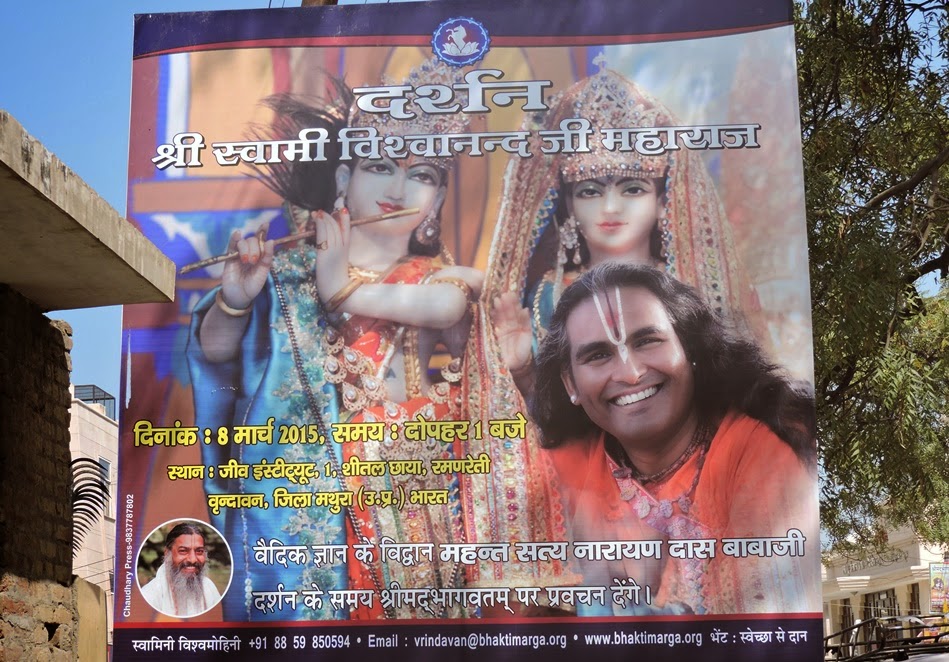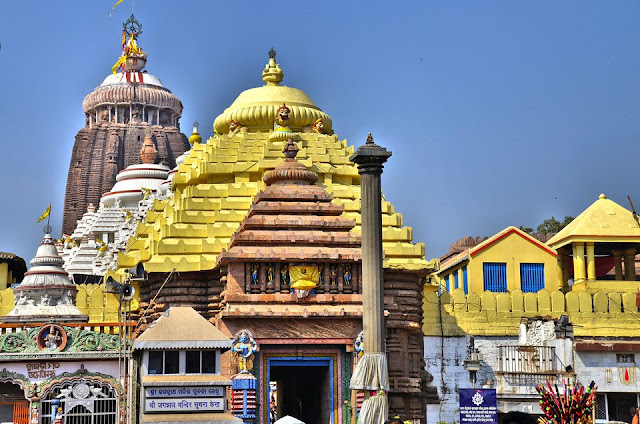Abhisāra in RRSN
Rādhā-rasa-sudhā-nidhi. We have been doing the wonderful descriptions of Radha's abhisāra in verses 19-22. Five or six people are coming every day, from a pool of about 10 or 15. Ananda Kumar Tiwari is the main man, though. He is so enthusiastic, it warms the heart. Just enough time to share some of it.
The abhisāra descriptions, though, fit in nicely with the theme of the poem that I wrote the other day. Ananta Das seems to say almost the exact same things as he describes how the kinkari serves Radha from beginning to end of the abhisāra. First by making Radha conscious enough to go after she hears the flute to protecting her on the way:
"No, swamini, you are going too fast. Wait for me, I can't keep up. Besides, if you go too fast, you might fall and hurt yourself. What if you scratch your feet, which are Govinda's very life?"
dṛṣṭvaiva candrakam atīva-camatkṛtāṅgī
veṇu-dhvaniṁ kva ca niśamya ca vihvalāṅgī |
sā śyāmasundara-guṇair anugīyamānaiḥ
prītā pariṣvajatu māṁ vṛṣabhānu-putrī ||19||
Ananta Dasji here again begins his commentary with one of the many points that are important in his vision of the devotional path: that eternally siddha associates of the Lord actually seek out the condition of a sadhaka because of the unique opportunities for relishing the lilas.
This verse is the prelude to the abhisāra. Ananta Dasji sees Radha's progressive eagerness to be with Krishna being stimulated by the kinkari's descriptions of his virtues. She embraces the manjari and says, "So what are we waiting for? Take me to him right now!"
śrī-rādhike sura-taraṅgi nitamba-bhāge
kāñcī-kalāpa-kalahaṁsa-kalānulāpaiḥ |
mañjīra-śiñjita-madhuvrata-guñjitāṅghri-
paṅkeruhaiḥ śiśiraya sva-rasa-cchaṭābhiḥ ||20||
śrī-rādhike sura-taraṅgiṇi divya-keli-
kallola-mālini lasad-vadanāravinde |
śyāmāmṛtāmbu-nidhi-saṅgama-tīvra-veginy
āvartanābhirucire mama sannidhehi ||21||
sat-prema-sindhu-makaranda-rasaugha-dhārā-
sārān ajasram abhitaḥ sravad āśriteṣu |
śrī-rādhike tava kadā caraṇāravindaṁ
govinda-jīvana-dhanaṁ śirasā vahāmi ||22||
The theme of the river flowing to Krishna is one that comes up in several places. One of the most famous is of course in Kapila's definition of nirguṇa-bhakti:
The abhisāra descriptions, though, fit in nicely with the theme of the poem that I wrote the other day. Ananta Das seems to say almost the exact same things as he describes how the kinkari serves Radha from beginning to end of the abhisāra. First by making Radha conscious enough to go after she hears the flute to protecting her on the way:
"No, swamini, you are going too fast. Wait for me, I can't keep up. Besides, if you go too fast, you might fall and hurt yourself. What if you scratch your feet, which are Govinda's very life?"
veṇu-dhvaniṁ kva ca niśamya ca vihvalāṅgī |
sā śyāmasundara-guṇair anugīyamānaiḥ
prītā pariṣvajatu māṁ vṛṣabhānu-putrī ||19||
Seeing a peacock feather, Radha's body becomes still with astonishment. Hearing the sound of Krishna's flute, her body begins to tremble. And then [in this state of mind], being pleased with my singing of the glories of Shyamasundar's virtues, the daughter of Vrishabhanu will embrace me.Ananta Das's reading here campakalateva in the first line does not make much sense, so I have taken Harilal Vyas's reading.
Ananta Dasji here again begins his commentary with one of the many points that are important in his vision of the devotional path: that eternally siddha associates of the Lord actually seek out the condition of a sadhaka because of the unique opportunities for relishing the lilas.
This verse is the prelude to the abhisāra. Ananta Dasji sees Radha's progressive eagerness to be with Krishna being stimulated by the kinkari's descriptions of his virtues. She embraces the manjari and says, "So what are we waiting for? Take me to him right now!"
kāñcī-kalāpa-kalahaṁsa-kalānulāpaiḥ |
mañjīra-śiñjita-madhuvrata-guñjitāṅghri-
paṅkeruhaiḥ śiśiraya sva-rasa-cchaṭābhiḥ ||20||
Oh Radhe! Taking pleasure in love, you flow like the river of the gods [on abhisāra to meet Krishna], so please refresh me by splashing me with your waters. On your banks (hips) are the kanchi bells that chime like the sound of swans honking, and your feet the chiming of the ankle bells makes us think of bees in a lotus garden in the river.This and the next verse pun on the words sura-taraṅgiṇi, "the wavy river of the gods, i.e. Ganga", which can also be split as surata-raṅgiṇi, which means taking pleasure in love making. Prabodhananda makes use of the image to see Radha flowing toward Krishna on abhisāra.
kallola-mālini lasad-vadanāravinde |
śyāmāmṛtāmbu-nidhi-saṅgama-tīvra-veginy
āvartanābhirucire mama sannidhehi ||21||
Oh Radhe! Taking pleasure in love, you flow like the river of the gods [on abhisāra to meet Krishna], you are garlanded with waves of divine diversions, your lotus face blooming, you rush forward to meet with the ocean of nectarean waters that is Shyamasundar. You mind is spinning like a whirlpool! Though it looks charming, you had better stay close to me.The manjari's seva is clarified a little further. She is so overcome by her desire to meet with Krishna that she has lost external consciousness, and is spinning like a top. How easily she could trip and fall! The manjari's presence is necessary to protect her. Nāyikā-prāṇa-saṁrakṣā is one of the sakhi's duties (UN 8.99, 123).
sārān ajasram abhitaḥ sravad āśriteṣu |
śrī-rādhike tava kadā caraṇāravindaṁ
govinda-jīvana-dhanaṁ śirasā vahāmi ||22||
Oh Radhike ! Your lotus feet are the fountain from which unlimited torrents of ambrosia flow like a river of true love. They are Govinda's life and soul. When will I hold them on my head?Here, Ananta Dasji keeps the theme of the abhisāra alive, relating Prabodhananda's mood to that of the gopis in the last verse of the Gopī-gīta: "As you run so hastily and so unconsciously towards the meeting place, you are sure to suffer cuts and bruises from the pebbles and shoots on the path. Your feet are so valuable not only to me but to Krishna, so I wish I could carry you so that you need not suffer. Your body is so light, surely I could carry it... and moreover, since your feet are flowing with this never-ending rasa of sat-prema, I would be exceedingly blessed if you would let me... And remember, your feet are Krishna's life and soul. You have to take care of them for his sake."
The theme of the river flowing to Krishna is one that comes up in several places. One of the most famous is of course in Kapila's definition of nirguṇa-bhakti:
mad-guṇa-śruti-mātreṇa mayi sarva guhāśaye
mano gatir avicchinnā yathā gaṅgāmbhaso'mbudhau
lakṣaṇaṁ bhakti-yogasya nirguṇasya hy udāhṛtam
ahaituky avyavahitā yā bhaktiḥ puruṣottame
The primary sign that pure union in devotion, free from any material quality, has appeared in someone’s heart comes when, upon hearing about my qualities, that person’s thoughts are drawn immediately and irresistably towards me, the indweller of every beings, in the same way that the waters of the Ganges flow toward the sea. Like the flow of the Ganges, such devotion to the Supreme Person is unmotivated and unimpeded. (SB 3.29.10-11)
Another directly relates to the gopis--
tā nāvidan mayy anuṣaṅga-baddha-
dhiyaḥ svam ātmānam adas tathedam |
yathā samādhau munayo’bdi-toye
nadyaḥ praviṣṭā iva nāma rūpe ||
They knew nothing of themselves or this or that, for their minds were totally lost in consciousness of me, like sages in samadhi, like rivers flowing to the ocean, like names into formes, they merged completely. (11.12.12)I will just add one more, taken from the Gopāla-campū (Pūrva 23v36), describing the gopis' abhisāra at the time of the Rāsa dance. This is written in the highly rhythmic tūṇaka meter of alternating short and long syllables. [still undergoing revision]
satvara-prasāravattva-sattva-dhāma-hāyinī
sarva-gurv-ahārya-kūṭa-vāraṇātiyāyinī |
nātham ekam anv aneka-dāra-sampad-arpiṇī
ogham ogham anv ananta-bhakta-loka-tarpiṇī ||a||
[a] The gopi river quickly welled up and forcefully abandoned the homes
overcoming the tricky barriers placed by all their seniors
[just as the rivers flow over the great mountain peaks
to tumble down from the spring that is their source),
offering their abundant wifely treasure to their one lord and husband,
in its persistent torrents, unlimited devotees offered oblations;
lola-keśa-śaivalāñci-karṇa-pūra-cakriṇī
puṣpa-jāta-niṣprapāta-śubhra-pheṇa-cakriṇī |
ucchalan-navīna-mīna-netra-nīra-gātriṇī
agrimādhva-mātra-pātra-sammukhānuyātriṇī ||b||
[b] the algae of their hair streamed over ruddy goose-like ear flowers
while a waterfall of flowers created whirlpools of white foam;
the gopi river’s body the water pouring from their fish-shaped eyes,
and forward it flowed, like rivers following its single riverbed course.
manda-cāla-bāhu-nāla-pāṇi-padma-sālinī
accha-bāla-kacchapāṅga-vatsa-janma-jālinī |
jūti-dhūti-kṛt-kuṭīra-tīra-dhīra-gāminī
ūru-bhūruhāli-pāta-samprapāta-kāminī ||c||
[c] Their lotus hands waved at the ends of their waving arm stalks;
a net in which were caught their pure young turtle-shaped breasts;
slowing its flow walked slowly along the banks of the Yamunä,
their waists shaking too and fro rhythmically,
their thighs like trees seemed to wish to fall over in their haste.
kāñci-kāñci-kaṅkaṇādi-śiñjad-ambha-sañjinī
prāyaśas tu haṁsa-saṅgha-śṣabditānurañjinī |
tūrṇa-tūrṇa-ghūrṇanādi-saṅkulāṅga-nartinī
pūrṇa-pūrṇa-bhāva-gūrṇa-jāḍya-jāta-vartinī ||d||
[d] The bells on their girdles and the bangles they wore
made a jingling sound like the rush of water,
and sounded almost exactly like the cackling of the geese.
As they moved quicker and quicker,
they became dizzy and all their limbs
danced like the turbulent waters of rapids,
and again, sometimes as they felt perfectly satisfied,
they would feel an agreeable sensation of inaction
and would suddenly remain still.
veśa-vastra-sanniveśa-cañcalatva-bhaṅginī
tat-tad-artha-vaiparītya-kāri-vega-saṅginī |
yan-nimittam ātma-sarva-saṅga-bhaṅga-bhāvinī
yatra sarva-nāma-rūpa-vismrtiś ca bhāvinī ||e||
[e] From time to time they would become anxious
about the arrangement of their clothing and makeup,
for they were being carried along with such speed
that they had all become mixed up.
for whom they had broken all their personal relationships,
and for whom they had forgotten everything --
even their own names and forms.
śyāma-dhāma-suṣṭhu-rāmam etam atra sad-dhavam
sindhu-tulyam uttaraṅgad-aṅgam āśu mādhavam |
pūrva-pūrva-bhinnayātir uttarāpta-saṅgatiḥ
āpagāli-sammitāpa seyam āli-saṁhatiḥ ||f||
[f] This assemblage of friends,
each of whom was like a river,
though taking separate paths,
in the end quickly reached Mädhava,
their eternal husband, outstandingly beautiful
and glowing with a black effulgence,
who was like the ocean overflowing with rising waves;




Comments